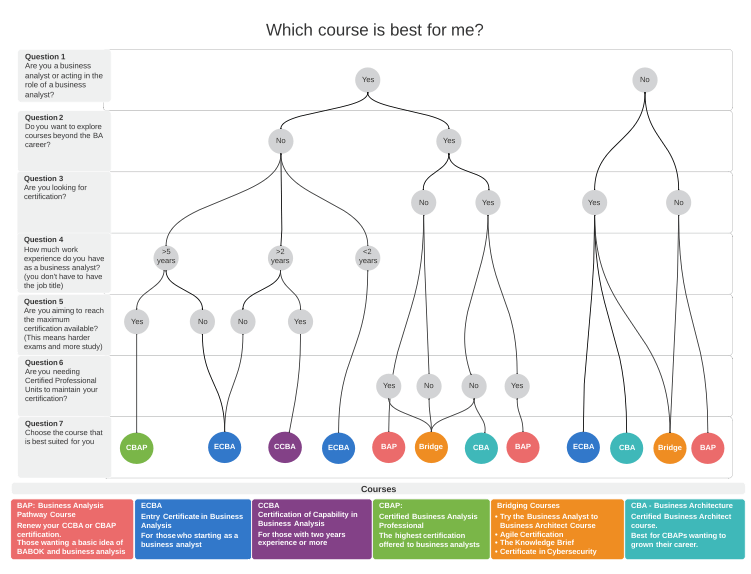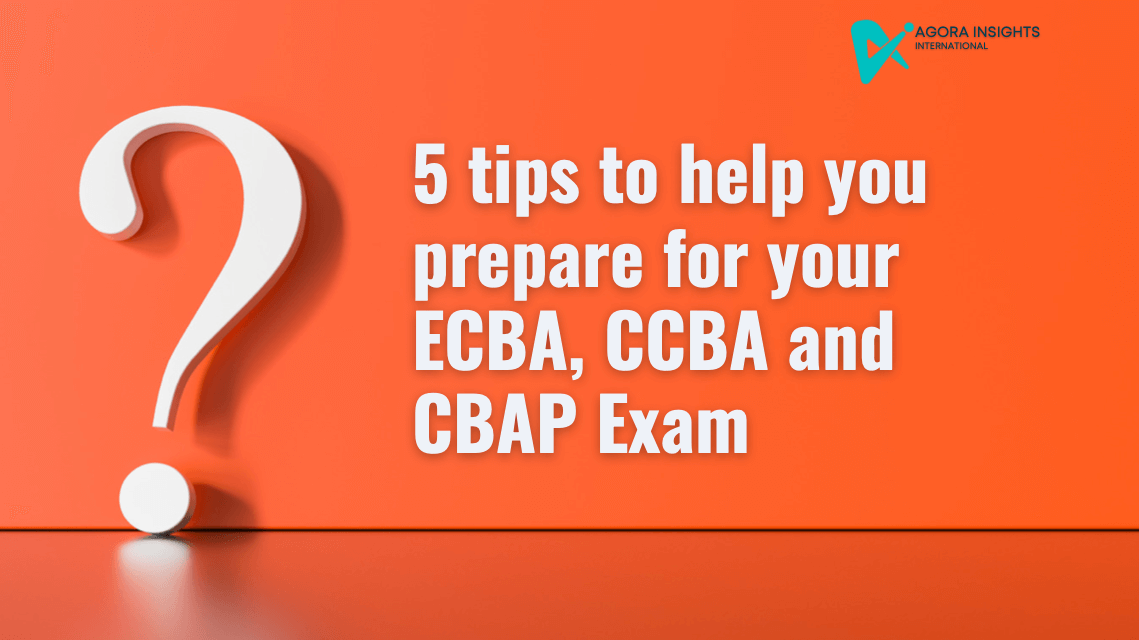You're interested in getting certified as a business analyst, but you don't know where to start? You've heard that the International Institute of Business Analysis (IIBA) offers certification, but you don't know what it entails?
Should I get certified as a business analyst?

There is no point in aiming for certification if you are not interested in building your business analysis career. But if you are wanting to grow your career in this field, then it is helpful to get the certification associated with the role.
Business analysts work with organizations to help them define and solve business problems. They do this by gathering and analyzing information, and then recommending solutions. Business analysts must be able to think critically and creatively, and have strong problem-solving skills. They must also be able to communicate effectively, both verbally and in writing.
Business analysts typically work in teams, but may also work independently. They may be involved in a variety of projects, such as process improvement, system implementation, or market research.
Which business analyst certification is best for me?

The role of a business analyst is critical to the success of any organization. If you are interested in becoming a business analyst, the IIBA certification is a great way to start. The ECBA certification is the entry-level certification, and it is designed for individuals who are new to the field of business analysis. The CCBA certification is for practitioners, and the CBAP certification is for professionals.
The three levels of certification for business analysts:
- entry level (ECBA),
- practitioner level (CCBA), and
- professional level (CBAP).
Each level has its own set of requirements, but all three require passing an exam. Here's what you need to know to pass your IIBA business analysis exams.
More about ECBA
The ECBA certification is a great way to start your career as a business analyst. It demonstrates that you have basic knowledge of the skills and concepts required for the job. If you are interested in becoming a business analyst, the ECBA certification is a good place to start. The ECBA certification is the entry-level certification, and it is designed for individuals who are new to the field of business analysis. No previous experience is required.
To be eligible for ECBA you should have
- Ensure you register an account with IIBA
- Complete a minimum of 21 Professional Development (PD) hours within the last four years.
- Agree with the Code of Conduct.
- Agree with Terms and Conditions.
More about CCBA
CCBA certification is for practitioners, and it is designed for individuals who have at least two years of experience in the field of business analysis. To qualify for the CCBA certification, you must pass an exam that assesses your knowledge and skills in business analysis. The exam consists of 150 multiple-choice questions, and you have three hours to complete it.
The CCBA certification demonstrates that you have the knowledge and skills required to be a successful practitioner. It is a great way to prove your proficiency in business analysis, and it can help you stand out from the competition.
To earn the CCBA designation, candidates must:
- Complete a minimum of 3,750 hours of Business Analysis work experience in the last 7 years
- Within these 3750 minimum hours required, a minimum of 900 hours must be completed in each of 2 of the 6 BABOK® Guide Knowledge Areas OR, a minimum of 500 hours must be completed in each of 4 of the 6 BABOK® Guide Knowledge Areas
- Complete a minimum of 21 hours of Professional Development within the last 4 years
- Provide references
- Agree to Code of Conduct
- Agree to Terms and Conditions
- Pass the exam
- More about CBAP
More about CBAP
CBAP certification is for professionals, and it is designed for individuals who have at least five years of experience in the field of business analysis. To qualify for the CBAP certification, you must pass an exam that assesses your knowledge and skills in business analysis. The exam consists of 120 multiple-choice questions, and you have 3.5 hours to complete it.
The CBAP certification demonstrates you are a professional business analyst. It is a great way to prove your proficiency in business analysis, and it can help you stand out from the competition.
To be eligible for CBAP you need to meet the following criteria
- Complete a minimum of 7,500 hours of Business Analysis Work experience in the last 10 years
- Within this experience, a minimum of 900 hours completed in 4 of the 6 BABOK® Guide Knowledge Areas, for a total of at least 3,600 of the required 7,500 total
- Complete a minimum of 35 hours of Professional development in the last 4 years
- Provide two references
- Agree to Code of Conduct
- Agree to Terms and Conditions
- Pass the exam
5 tips to prepare you for you exam

To prepare for your IIBA business analysis exams, you need to understand the BABOK Guide and the learning objectives that are tested on the exams. You also need to practice answering exam questions. The best way to do this is by using exam prep materials from a reputable source.
Step 1: Get your copy of the BABOK Guide
The first step is to become familiar with the IIBA Business Analysis Body of Knowledge (BABOK), which outlines the knowledge and skills that are necessary for business analysts. As a member of the IIBA, you receive a complimentary copy of the BABOK. Next, decide which level of certification you're going for and make sure you meet the requirements. Once you've done that, you can start your preparation process.
Step 2: Select your learning resources
There are a few different ways to prepare for the exam. You can take an IIBA-approved course, hire a tutor, or study on your own using practice exams and other resources. Whichever route you choose, make sure you give yourself enough time to prepare—the last thing you want is to be rushed and end up not being fully prepared on test day. Training is a good way to prepare for your IIBA exam because it gives you the opportunity to learn from an expert instructor and ask questions. Training also includes practice exams that allow you to test your knowledge and identify any areas that need more attention.
Step 3: Understand your learning blueprint
It is critical for a business analyst to understand the learning blueprint for the IIBA exams (ECBA, CCBA, CBAP). Each one is unique and becomes more complex as you reach CBAP level. Many people concentrate on learning the BABOK but have no idea what they are being tested on. This is a mistake on the part of the learners because, as with any test, you will be tested on what you need to know/understand. The IIBA has published a detailed learning blueprint for each of the exams, which is well worth reviewing before starting your exam preparation. Understanding the exam format and content ensures that there are no "surprises" on exam day. The IIBA has released sample exam questions for each of the certification exams, so make sure you know what to expect.
Because your learning is important to us, we provide free explainers of the learning blueprint as well as the readiness tests based on the sample exam questions.
To access this information and more go to one of the options and select "Free Preview"
Step 4: Take practice exams
Practice exams are a good way to prepare for certification exams because they allow you to test your knowledge and identify any areas that need more attention. They also help you become familiar with the exam format and the types of questions that are likely to be asked. Most importantly, practise exams help you develop the test-taking skills you need to succeed on exam day.
NOTE: It's important to do a practice exam multiple times before you take your certification exam. This will help you become familiar with the format and the types of questions that are likely to be asked. It will also help you develop the test-taking skills you need to succeed on exam day.
Step 5: Schedule in advance
An online exam is a type of exam that can be taken from the comfort of your own home. It's a good option if you're unable to travel to a testing center, or if you want to save money on travel fees. The downside is that you may not get the same level of technical support and human feedback as you would from a venue based exam.
The time of day you choose to take your exam can affect your ability to perform your best. Some people prefer to take exams in the morning, while others do better in the afternoon or evening. The key is to find the time of day that works best for you and to stick with it.
If you're not sure what time of day is best for you, try taking a practice exam at different times of the day to see which one produces the best results. You may also want to consider your work and personal schedule when deciding on a test time.
Do note - the ECBA exam is only offered online
One last tip: don't forget to schedule your exam well in advance. The IIBA offers exams year-round at testing centres around the world, but spots fill up quickly, so it's important to register as soon as possible. You can change your exam date if you find you are not progressing as planned.
Registering for your exam well in advance allows you to reserve a spot and avoid any potential scheduling conflicts. It also provides you with a deadline date to prepare and schedule for the exam, which is important for achieving success.
Conclusion:
Passing your IIBA business analysis exams is a great way to get ahead in your career. By becoming certified, you'll be able to show potential employers that you have the skills and knowledge necessary to be successful in the field. And while studying for the exam can be challenging, it's definitely worth it in the end. So what are you waiting for? Get started on your preparation today!
Note: This post has been sponsored by Agora Insights Ltd

Post a Comment